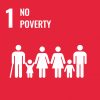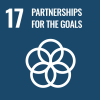Northwest Syria – Nine-year-old Musa is passionate about learning. But the impact of 13 years of war means his mother, Um Mousa, can barely cover the basic expenses for his education.
He and his mother have been displaced for years, living in a camp in an old, worn-out tent that doesn’t protect them from harsh weather.
“My husband, who was the only breadwinner, passed away seven years ago. Since then, it just has been us. We have faced many difficulties,” says Um Mousa.
As a single mother, she constantly has many things on her mind. Most urgently, she wonders where to get warm clothes for her son as the winter approaches.
With the school year resuming, Musa has been asking for a school bag, notebooks and pens. For now, it unfortunately seems out of reach.

As a widow raising ten children, Um Mohamad worries every day how to put food on the table. Photo: IOM, Shafak Organization
Um Mohamad is in the same predicament. After her husband passed away five years ago, she has been displaced and caring for her ten children alone.
Securing basic necessities for her family is a daily struggle.
“To survive, my older children have to work in various jobs, such as farming and harvesting,” she said with regret.
Despite their collective efforts, the income they earn is barely enough to buy bread and a few basic food staples for their daily meals.


After receiving cash assistance, Musa was finally able to get notebooks and pens for his schooling. Photo: IOM, Shafak Organization
In Northwest Syria, needs are at their highest – 4.2 million people, or 82 per cent of the population, require humanitarian assistance.
Multipurpose cash assistance (MPCA) has been a core component of the International Organization for Migration’s (IOM) response. This modality empowers internally displaced families with the flexibility and autonomy to meet their most immediate needs. Recipients are selected based on rigorous vulnerability assessments.
Um Mousa’s and Um Mohamad’s families were among 1,562 households to benefit from an emergency MPCA programme launched by IOM, in partnership with Shafak Organization and with funding from USAID’s Bureau of Humanitarian Assistance. They each received USD 400, distributed across four rounds.
“Our situation improved a little. I managed to pay off some debts and bought essential school supplies for Musa, as well as food for both of us,” said Um Mousa.
Musa had long been asking for fruits, which she could never afford. She was glad to finally be able to meet his craving.
Meanwhile, Um Mohamad also managed to repay the debts she had accumulated. “With the remainder, I was able to purchase some vegetables and essential food items,” she explains.


With the support, Um Mohamed was able to purchase a wider range of food items. Photo: IOM, Shafak Organization
Although offering urgent, temporary respite to both single widows, their long-term needs are far from being met.
Funding for the humanitarian response has been at its lowest since the beginning of the war. Coupled with ongoing hostilities, this threatens to reverse gains made in recovery. IOM’s own MPCA programme will halt by the end of the year without any renewed funding.
“I am worried the money will run out soon, and we still lack many necessities. We need coal, firewood and a stove for the winter, but I am sick and unable to work,” Um Mousa laments.
Despite their ordeals, both mothers are determined not to give up.
“I pray that I will be able to provide everything we need to stay safe,” Um Mousa wishes.
Um Mohamad dreams of one day securing an apartment for her family, where they can live in better conditions – instead of the flimsy tent they are currently cramped in.
“Despite everything, I cling on to the hope that a better future awaits us.”
Written by Miko Alazas, IOM Türkiye Media and Communications Officer



